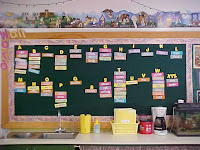 For my real life inquiry I visited an elementary school during interventions (or small groups) for a fifth grade class. The teacher took a group of five students into a small room while an assistant worked with the rest of the class. When the five students came in the first thing they did was a timed reading activity. One at a time the students read a passage based on previous reading skills tests and they were graded on accuracy. I am not so sure I really liked the students working on this activity in the room together because while one student was reading, the other students were talking about who had the best score and other things that were not related to reading at all. After the students were finished with their timed readings they were all given a book and they took turns reading aloud, on words they didn't know the teacher would help them. The teacher also worked on some think aloud activities so the students could talk about what they thought about the book as they were reading, but they did not do any predictions or picture walking.
For my real life inquiry I visited an elementary school during interventions (or small groups) for a fifth grade class. The teacher took a group of five students into a small room while an assistant worked with the rest of the class. When the five students came in the first thing they did was a timed reading activity. One at a time the students read a passage based on previous reading skills tests and they were graded on accuracy. I am not so sure I really liked the students working on this activity in the room together because while one student was reading, the other students were talking about who had the best score and other things that were not related to reading at all. After the students were finished with their timed readings they were all given a book and they took turns reading aloud, on words they didn't know the teacher would help them. The teacher also worked on some think aloud activities so the students could talk about what they thought about the book as they were reading, but they did not do any predictions or picture walking.
I really enjoyed the interventions that the students participated in, and I think it is something that I would like to use in my class room one day if the resources were available.
I really liked the read aloud and think aloud sections of the activity, and I think it greatly benefited the students. Things I would have improved about the interventions would be some way to keep the students occupied while their fellow student was reading. Another thing I would change is for the students to do a project and teach the rest of the class about the book the students read together (like we talked about in our class)--I really like this idea and think it enhances the reading experience and comprehension. I think that my experience really epitomized a lot of what we have learned and read about in class this past week on guided reading and groups.
Do you think that this is a useful tool in a classroom?
What would you add to make a classroom more interesting during reading interventions?


